Pain & Gain Review: Bad to the Bone, Real Bad
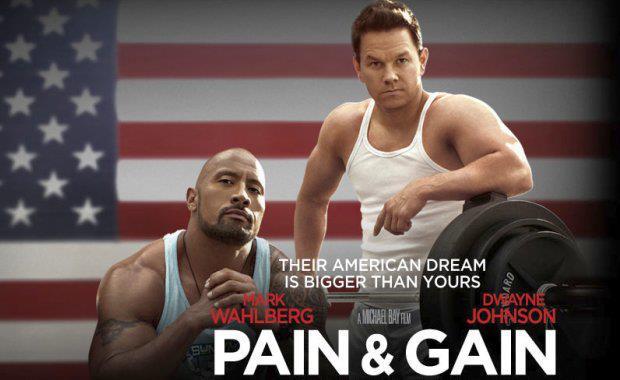
Did Michael Bay really think this was a good idea? Did he seriously believe that a comedy about a true-life tragedy was something to be brought to the big screen? I mean I know bad taste, but his latest film,
Pain & Gain, speeds right past black satire and drives itself into a bizarre universe that mistakenly tries to channel comedy by mixing shock humor and sight gags with sadism.
The mistake, I suppose, starts near the beginning when Daniel Lugo (Mark Wahlberg), a bodybuilder who runs a workout center in Miami called the Sun Gym, is seen running from the police in close-up, slow-motion shaky-cam style. This blend of visual quirkiness is a trademark of the director’s who uses them to emphasize action. But from there on out, when the film is going back to explain why Lugo is being chased, this cinematic fingerprint isn’t carried out into the rest of the film, which is mostly composed of simplistic “rule of thirds” framing, upward angled shots of the sky and peoples’ chins, and screaming production values of the like.
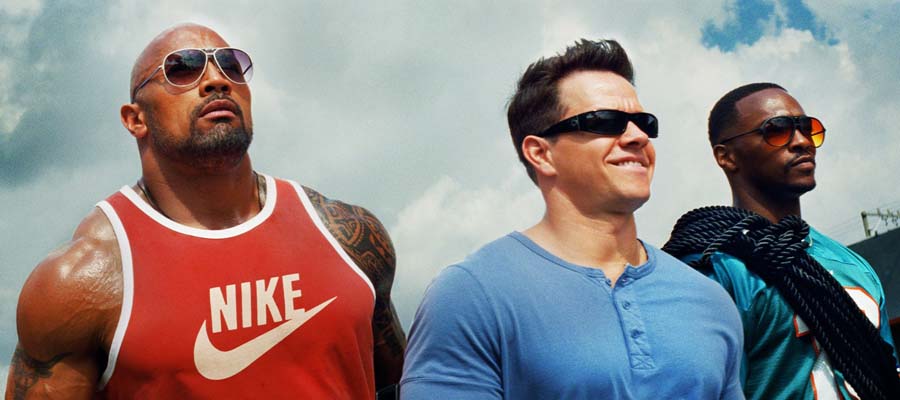
But Bay’s abandonment of his camera techniques for the sake of his movie coming together in terms of visual cinematic coherence may be the least of the problems here. Frankly, the incoherence branches out into the script, particularly when we are introduced to other characters like Adrian Doorbal (Anthony Mackie), Paul Doyle (Dwayne Johnson), and Victor Kershaw (Tony Shalhoub). As the film funnels backward to gain a bigger comprehension of Lugo’s story, we meet Kershaw, who has the fortune of having a fortune to his name, at the gym being coached by Lugo. Lugo, meanwhile, has been attending self-help seminars by a man who plants the seed in his mind that there are only two types of people in this world: “do-ers” and “don’t-ers.” This, mixed in with Lugo’s criminal background of heading a fraudulent business, sets up the rest of the movie about his exploding redemption and belief in being awarded second chances.
Tired of his existing life as a recently released, financially well-off convict, Lugo hatches the idea to pilfer Kershaw’s assets. Being dragged into this is Doorbal, a bodybuilding friend of Lugo’s. Of course, it would seem the steroids he abuses himself regularly with have not only, as we learn, shrunken his own “assets,” but his sense of morality and humanity as well. Also coming into the picture is Johnson as Doyle, another recently released convict who has found Jesus to be his life’s biggest influence.
Eventually, all three agree to the plan, which pretty much consists of Mackie and Johnson running around in Halloween costumes trying to kidnap Kershaw. Then when they succeed—on their third attempt—they handcuff Kershaw to a chair in a deserted sex toy factory, occasionally assaulting him with dildo slaps to the face.
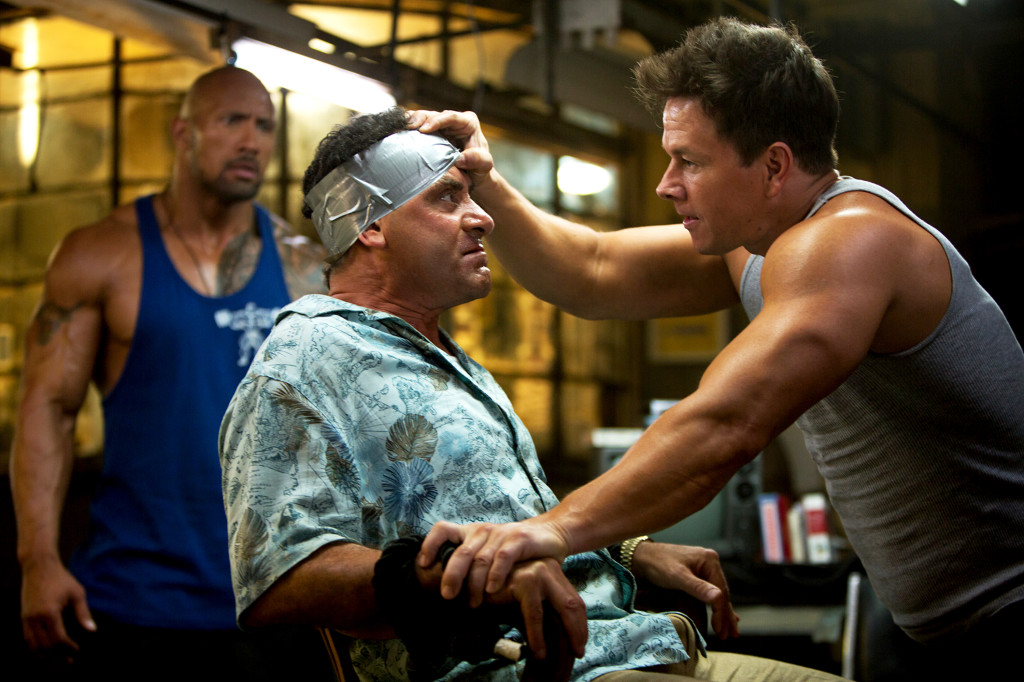
What happens next is each kidnapper is assigned the duty of watching over Kershaw until Kershaw signs. What we learn is Doyle is a religious hypocrite, preaching Christianity to the Jewish Kershaw while wearing “Team Jesus” shirts, Doorbal is getting expensive ejections to get his willie working, and Lugo continues to bug his boss, John Mese (Rob Corddry), about getting the signatures to Kershaw’s assets notarized.
From there, the bad guys get their money and spend it freely, until they run dry and decide to do another kidnapping job on a porn kingpin, all the while trying to track down Kershaw who they thought they left for dead. But the plot is just a candy wrapper for the movie, which is an exercise in farce: police don’t believe Kershaw’s story because they thought he was a part of a gangbang with the kidnappers; things go awry with the kidnappings as people die; the three stooges always walking together, whether it be in bodybuilding outfits or hospital scrubs; maxi pads taped to Kershaw’s eyes to keep him from seeing; the intentionally bad Arab and Spanish accents Lugo uses to mask his identity around Kershaw. But don’t worry, it’s all meant to be funny.
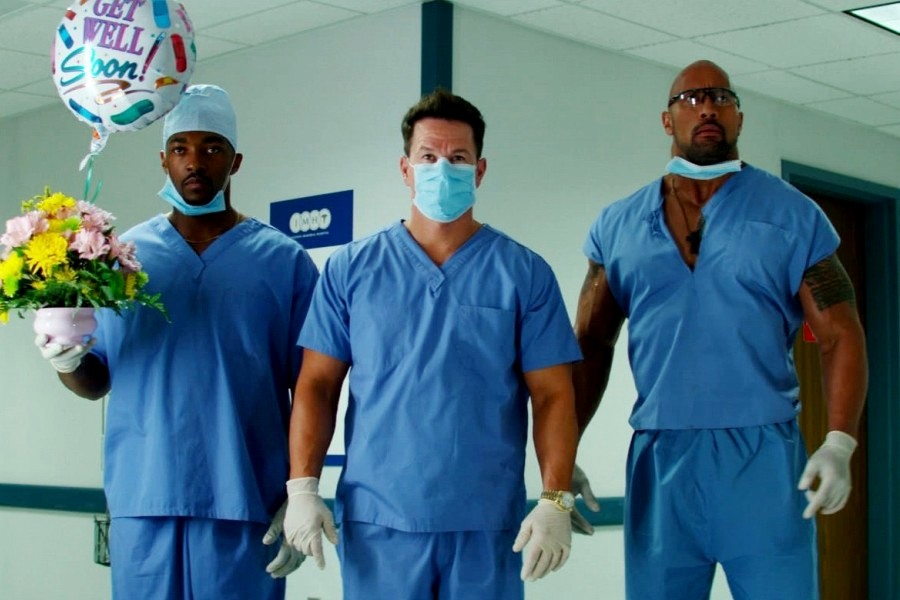
I can excuse that humor, even though it is labored. What I am appalled by is the comical tone the scenes of violence are directed in. Like how Bay thought rape could be funny when Lugo asks who, of a group of men with their wives in an open street seminar, wanted to play the rapist in a role-play. Or how he was convinced it was humorous when Lugo and Doorbal dismembered their victims while in their underwear and “kiss the cook” aprons. Or when Doyle is cooking human hands in the broad day of light with a big grin on his face. The only other time these guys seem to have as good a time is when they are in the strip club where Director Bay largely objectifies his female cast.
This is indeed that strange comedy that inspires depression.
It’s so strange that every main character narrates the story, confusing the audience whose story is most important, or who is most important for that matter. There is so much overhead narration that I was waiting to hear what the dog was thinking. Similarly, the actors operate their lines more with their physical expressions than their voices. All the wide-eyed bewilderment and clumsiness had me reminiscing the day I saw
Intolerable Cruelty, which is gold compared to this cow turd.
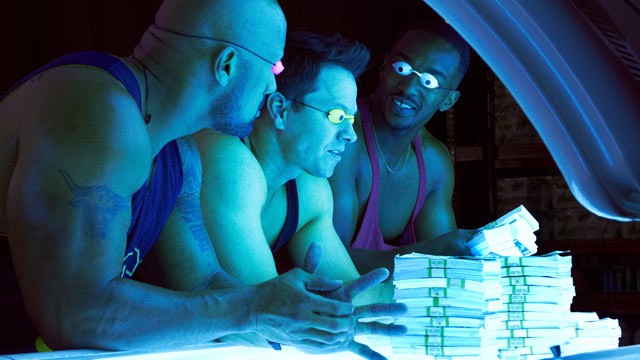
There are, however, a few scenes that lifted me out of such a dispirited state of mind, like the part when the camera is carouseling without pause around the house to capture the different groups of people in different rooms. But this is merely a surface detail in a movie that is as deep as it is shallow.
No doubt this is a film made to stretch and strain and test the limits of laughter. Michael Bay hit his targets, and I had a few chuckles here and there, but I find that I was involved in a joke that couldn’t be articulated, penetrated, or deconstructed. As a comedy, and more so a satire, that’s a pity.

 But Bay’s abandonment of his camera techniques for the sake of his movie coming together in terms of visual cinematic coherence may be the least of the problems here. Frankly, the incoherence branches out into the script, particularly when we are introduced to other characters like Adrian Doorbal (Anthony Mackie), Paul Doyle (Dwayne Johnson), and Victor Kershaw (Tony Shalhoub). As the film funnels backward to gain a bigger comprehension of Lugo’s story, we meet Kershaw, who has the fortune of having a fortune to his name, at the gym being coached by Lugo. Lugo, meanwhile, has been attending self-help seminars by a man who plants the seed in his mind that there are only two types of people in this world: “do-ers” and “don’t-ers.” This, mixed in with Lugo’s criminal background of heading a fraudulent business, sets up the rest of the movie about his exploding redemption and belief in being awarded second chances.
Tired of his existing life as a recently released, financially well-off convict, Lugo hatches the idea to pilfer Kershaw’s assets. Being dragged into this is Doorbal, a bodybuilding friend of Lugo’s. Of course, it would seem the steroids he abuses himself regularly with have not only, as we learn, shrunken his own “assets,” but his sense of morality and humanity as well. Also coming into the picture is Johnson as Doyle, another recently released convict who has found Jesus to be his life’s biggest influence.
Eventually, all three agree to the plan, which pretty much consists of Mackie and Johnson running around in Halloween costumes trying to kidnap Kershaw. Then when they succeed—on their third attempt—they handcuff Kershaw to a chair in a deserted sex toy factory, occasionally assaulting him with dildo slaps to the face.
But Bay’s abandonment of his camera techniques for the sake of his movie coming together in terms of visual cinematic coherence may be the least of the problems here. Frankly, the incoherence branches out into the script, particularly when we are introduced to other characters like Adrian Doorbal (Anthony Mackie), Paul Doyle (Dwayne Johnson), and Victor Kershaw (Tony Shalhoub). As the film funnels backward to gain a bigger comprehension of Lugo’s story, we meet Kershaw, who has the fortune of having a fortune to his name, at the gym being coached by Lugo. Lugo, meanwhile, has been attending self-help seminars by a man who plants the seed in his mind that there are only two types of people in this world: “do-ers” and “don’t-ers.” This, mixed in with Lugo’s criminal background of heading a fraudulent business, sets up the rest of the movie about his exploding redemption and belief in being awarded second chances.
Tired of his existing life as a recently released, financially well-off convict, Lugo hatches the idea to pilfer Kershaw’s assets. Being dragged into this is Doorbal, a bodybuilding friend of Lugo’s. Of course, it would seem the steroids he abuses himself regularly with have not only, as we learn, shrunken his own “assets,” but his sense of morality and humanity as well. Also coming into the picture is Johnson as Doyle, another recently released convict who has found Jesus to be his life’s biggest influence.
Eventually, all three agree to the plan, which pretty much consists of Mackie and Johnson running around in Halloween costumes trying to kidnap Kershaw. Then when they succeed—on their third attempt—they handcuff Kershaw to a chair in a deserted sex toy factory, occasionally assaulting him with dildo slaps to the face.
 What happens next is each kidnapper is assigned the duty of watching over Kershaw until Kershaw signs. What we learn is Doyle is a religious hypocrite, preaching Christianity to the Jewish Kershaw while wearing “Team Jesus” shirts, Doorbal is getting expensive ejections to get his willie working, and Lugo continues to bug his boss, John Mese (Rob Corddry), about getting the signatures to Kershaw’s assets notarized.
From there, the bad guys get their money and spend it freely, until they run dry and decide to do another kidnapping job on a porn kingpin, all the while trying to track down Kershaw who they thought they left for dead. But the plot is just a candy wrapper for the movie, which is an exercise in farce: police don’t believe Kershaw’s story because they thought he was a part of a gangbang with the kidnappers; things go awry with the kidnappings as people die; the three stooges always walking together, whether it be in bodybuilding outfits or hospital scrubs; maxi pads taped to Kershaw’s eyes to keep him from seeing; the intentionally bad Arab and Spanish accents Lugo uses to mask his identity around Kershaw. But don’t worry, it’s all meant to be funny.
What happens next is each kidnapper is assigned the duty of watching over Kershaw until Kershaw signs. What we learn is Doyle is a religious hypocrite, preaching Christianity to the Jewish Kershaw while wearing “Team Jesus” shirts, Doorbal is getting expensive ejections to get his willie working, and Lugo continues to bug his boss, John Mese (Rob Corddry), about getting the signatures to Kershaw’s assets notarized.
From there, the bad guys get their money and spend it freely, until they run dry and decide to do another kidnapping job on a porn kingpin, all the while trying to track down Kershaw who they thought they left for dead. But the plot is just a candy wrapper for the movie, which is an exercise in farce: police don’t believe Kershaw’s story because they thought he was a part of a gangbang with the kidnappers; things go awry with the kidnappings as people die; the three stooges always walking together, whether it be in bodybuilding outfits or hospital scrubs; maxi pads taped to Kershaw’s eyes to keep him from seeing; the intentionally bad Arab and Spanish accents Lugo uses to mask his identity around Kershaw. But don’t worry, it’s all meant to be funny.
 I can excuse that humor, even though it is labored. What I am appalled by is the comical tone the scenes of violence are directed in. Like how Bay thought rape could be funny when Lugo asks who, of a group of men with their wives in an open street seminar, wanted to play the rapist in a role-play. Or how he was convinced it was humorous when Lugo and Doorbal dismembered their victims while in their underwear and “kiss the cook” aprons. Or when Doyle is cooking human hands in the broad day of light with a big grin on his face. The only other time these guys seem to have as good a time is when they are in the strip club where Director Bay largely objectifies his female cast.
This is indeed that strange comedy that inspires depression.
It’s so strange that every main character narrates the story, confusing the audience whose story is most important, or who is most important for that matter. There is so much overhead narration that I was waiting to hear what the dog was thinking. Similarly, the actors operate their lines more with their physical expressions than their voices. All the wide-eyed bewilderment and clumsiness had me reminiscing the day I saw Intolerable Cruelty, which is gold compared to this cow turd.
I can excuse that humor, even though it is labored. What I am appalled by is the comical tone the scenes of violence are directed in. Like how Bay thought rape could be funny when Lugo asks who, of a group of men with their wives in an open street seminar, wanted to play the rapist in a role-play. Or how he was convinced it was humorous when Lugo and Doorbal dismembered their victims while in their underwear and “kiss the cook” aprons. Or when Doyle is cooking human hands in the broad day of light with a big grin on his face. The only other time these guys seem to have as good a time is when they are in the strip club where Director Bay largely objectifies his female cast.
This is indeed that strange comedy that inspires depression.
It’s so strange that every main character narrates the story, confusing the audience whose story is most important, or who is most important for that matter. There is so much overhead narration that I was waiting to hear what the dog was thinking. Similarly, the actors operate their lines more with their physical expressions than their voices. All the wide-eyed bewilderment and clumsiness had me reminiscing the day I saw Intolerable Cruelty, which is gold compared to this cow turd.
 There are, however, a few scenes that lifted me out of such a dispirited state of mind, like the part when the camera is carouseling without pause around the house to capture the different groups of people in different rooms. But this is merely a surface detail in a movie that is as deep as it is shallow.
No doubt this is a film made to stretch and strain and test the limits of laughter. Michael Bay hit his targets, and I had a few chuckles here and there, but I find that I was involved in a joke that couldn’t be articulated, penetrated, or deconstructed. As a comedy, and more so a satire, that’s a pity.
There are, however, a few scenes that lifted me out of such a dispirited state of mind, like the part when the camera is carouseling without pause around the house to capture the different groups of people in different rooms. But this is merely a surface detail in a movie that is as deep as it is shallow.
No doubt this is a film made to stretch and strain and test the limits of laughter. Michael Bay hit his targets, and I had a few chuckles here and there, but I find that I was involved in a joke that couldn’t be articulated, penetrated, or deconstructed. As a comedy, and more so a satire, that’s a pity.